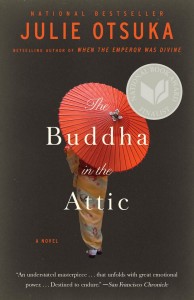JQ Magazine: Book Review – ‘The Buddha in the Attic’

“Just the right length, the perfect amount of general and specific, and no solid story but yet the story that so many people in the United States—and elsewhere—can tell about hope, and heartbreak, and the ways in which lives change that most of us never intend or imagine.” (Knopf)
By Liz Mathews (Hiroshima-ken, 2005-06) for JQ magazine. Liz is the JETAA New York Book Club wrangler.
I would like to start by saying that the JETAANY Book Club discussed reading Julie Otsuka’s The Buddha in the Attic for at least five months before choosing it for our fall meeting. This is notable because 1) we were right in our primary reason for putting it off; and 2) we were even more right in finally selecting it to read. It’s easy to explain the first note: Over the summer we thought it best to opt for a lighter, more beachy read, and not a novel about Japanese “picture brides” and their distressing existences in the United States of the early 20th century.
As for the second point, autumn and its colder, shorter, darker days did turn out to be a much more appropriate setting to read Otsuka’s carefully composed novel. Otsuka wrote her book in eight sections, writing mostly from the perspective of the women—the women as a united “we”—who came across the ocean to a new life of false promises, how they endured meeting their husbands the first time, how they got along (or didn’t) with their employers and new fellow countrymen, and what happened as a new, Japanese American generation grew.
For all the suffering in those first five sections, there is hope written between the lines. Hope for a new life with a wonderful husband, hope that hard work will pay off in acceptance, and hope for their children in that, as one of the paragraphs ends, “Whatever you do, don’t end up like me.” But then, as one club member put it, “You come to this country, you work your ass off, you think you’re getting somewhere…and then you don’t” (referring to the war’s outbreak).
When we got together to discuss The Buddha in the Attic, we spent a fair amount of time talking about the perspective the story was written from—first person plural—and how initially we didn’t like it, but then either grew accustomed to it or could at least appreciate it as a tool. One attendee stated, “Everyone’s situation is different. You can’t even generalize the Japanese experience.” Another pointed out, “[Otsuka] has a new story in every sentence.” We laughed a little at this realization, probably as all our thoughts turned back to our own departure orientations, when we were constantly told those very same things.
Although the book did not have a main character or plotline, we agreed that Otsuka did a great job of including little specifics in her paragraphs of more sweeping statements. One example that we could all relate to (as can many JETs who have an unfortunate L somewhere in their names) came in the chapter about the children assimilating into American culture: “They pronounced their l’s and r’s with ease.” We also found the Japanese stereotypes interesting: “Don’t be loud like the Americans. Stay away from the Chinese….Watch out for the Koreans….Never marry an Okinawan. They’re not real Japanese.”
We also discussed the Japanese internment in the United States, and how Otsuka treated it. One person stated, “I had to stop at the internment camp. I cannot consume more media where bad things happen to innocent people.” Another suggested that it’s relevant to what’s happening with Muslim people right now. And still another pointed out that a line in the book, from a mayor’s perspective, was actually a quote Otsuka lifted from a Department of Defense news briefing from Secretary of Defense Donald Rumsfeld in 2001: “There will be some things that people will see,” he tells us. “And there will be some things that people won’t see. These things happen. And life goes on.”
Both at the beginning and still at the end of our discussion, all of us were glad we finally read the book we’d been considering for months. Just the right length, the perfect amount of general and specific, and no solid story but yet the story that so many people in the United States—and elsewhere—can tell about hope, and heartbreak, and the ways in which lives change that most of us never intend or imagine.
For more JQ magazine book reviews, click here.


Comments are closed.